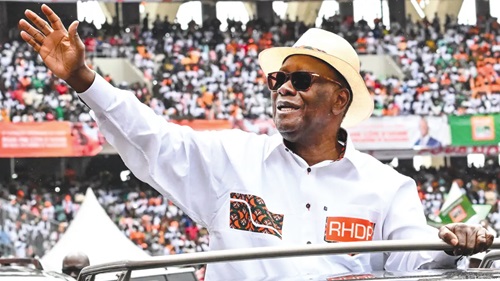On Saturday, October 25, Côte d’Ivoire will hold its presidential election, with more than 8.7 million Ivorians registered to vote.
Apart from the one who will emerge winner of the polls, all eyes will also be on the aftermath of the elections as the nation has yet to experience a peaceful transfer of power in 35 years of democracy
Indeed, since 1993, when Ivorians voted to choose a successor to their first President, Félix Houphouët-Boigny, elections have often sparked tensions, almost plunging the country into unrest.
No presidential election since 1995 has led to a peaceful transfer of power, and it seems history appears to be repeating itself as Ivorians head to the polls next week.
This year’s electoral process to choose a new President has been characterised by disputes over candidate disqualification. issues that marred the 1995, 2000, 2015, and 2020 polls—have once again surfaced, previously triggering widespread violence and deaths.
Candidates
President Alassane Ouattara, is running for a fourth term as President of Côte d’Ivoire, having superintended over constitutional changes in 2016, which reset term limits for presidents.
On September 8, 2025, the Constitutional Council accepted only five of the 60 candidates who had submitted their applications.
Similarly in 2020, it had accepted four out of 44.
The four opponents set to challenge Ouattara are well known on the political scene, but their lack of financial and logistical support from the two main Ivorian opposition parties considerably limits their chances of winning.
One person whose inclusion has sparked interest and talk is 76-year-old Simone Gbagbo, not because she is one of two women on the ballot, but also a former First Lady, contesting on the ticket of the Movement of Capable Generations (MGC)
She was the First Lady during the tumultuous presidency of her then-husband, Laurent Gbagbo.
Mr Gbagbo led the country through a civil war between 2002 and 2007, and he refused to step down after losing to Ouattara in the 2010 election, a situation that triggered another conflict.
Also on the ballot is Jean-Louis Billon, 60, who is representing the Democratic Congress, a new coalition of 18 parties and political movements.
A former trade minister, Billon had earlier sought to become the presidential candidate for the main opposition PDCI, this year, after its leader, former Credit Suisse CEO, Tidjane Thiam, was barred from running, but was unsuccessful.
Another protege of former President Gbagbo,Ahoua Don Mello, is contesting as an independent candadite.
Mello served as Mr Gbagbo’s spokesperson during the 2010-11 election crisis, however, he was kicked out of Gbagbo's political party, the African People's Party of the Cote d’Ivoire (PPA-CI), after he decided to contest the flagbearership against the party’s choice, Henriette Lagou Adjoua, a former Minister of Social Affairs and of Women, Families and Children.
The PPA-CI chose Adjoua as its flagbearer
The favourite
By far, the favourite, Ouattara said in a video message on his X account that both the constitution and his health allow him to serve another term.
When the ruling Rally of Houphouëtists for Democracy and Peace (RHDP) nominated him for the top job, the 83-year-old , who has led Côte d’Ivoire since 2011, explained his decision to renege on an earlier promise not to run again, saying: "Duty sometimes takes precedence over a promise made in good faith."
He had earlier called for a renewal of political personnel in March 2020, and had even publicly named a successor, former Prime Minister, Amadou Gon Coulibaly, who was to run in his place in the 2020 presidential election.
However, Coulibaly died in July 2020, three months before the election, and the president ultimately ran for a third term, and now going for a fourth.
This new candidacy has reignited the debate on the legality of a fourth term, providing yet another opportunity for political parties to avoid talking about their plans for society, and instead get caught up in legal quibbles about the constitutionality or unconstitutionality of the outgoing president’s new candidacy.
Opposition barred from running
Several opposition candidates have been barred from the upcoming election, despite a joint campaign by the biggest parties demanding their party leaders be reinstated as presidential candidates.
The disqualifications have been criticised domestically and internationally as damaging to Ivorian democracy and undermining the legitimacy of the electoral process.
Ouattara's announcement comes amid political polarisation and legal challenges, intensifying the already fraught political landscape ahead of the October election.
Tidjane Thiam (PDCI-RDA) was disqualified for formerly being an Ivorian-French dual citizen, even though Thiam has renounced his French nationality.
Thousands of his supporters took to the streets in Abidjan to protest against his disqualification.
And former President Gbagbo, his former aide Charles Ble Goude and former Prime Minister, Guillaume Soro, have also been excluded, mainly due to legal convictions or restrictions stemming from past political conflicts.
The ongoing dispute regarding the exclusion of opposition candidates is reminiscent of the violent electoral conflicts of the past, notably the 2010-2011 crisis that resulted in over 3,000 fatalities.
Ouattara's contentious third-term campaign in 2020, which followed the death of his chosen successor, Coulibaly, also ignited turmoil, which led to the death of 85 people.
The opposition views Outtara's running for a fourth term as yet another breach of the Ivorian constitution, and wants to challenge it in court.
"Despite all our warnings, it is clear the president's word holds little weight," Damana Adia Pickass, Vice-President of the party led by Outtara's predecessor, Laurent Gbagbo, told DW.
This economically powerful country, which is more secure than many of its neighbours, remains politically vulnerable, particularly when it comes to choosing its head of state.
Next Saturday’s presidential election is taking place in a rapidly changing geopolitical context, which could accentuate the weaknesses of the Ivorian political system and facilitate the destabilisation of a country that has historically been vulnerable when choosing its president.
Since the 2020 election, the regional and international context has changed profoundly.

